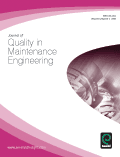
Journal of Quality in Maintenance Engineering
Scope & Guideline
Advancing Excellence in Maintenance Engineering
Introduction
Aims and Scopes
- Predictive and Condition-Based Maintenance:
Research focused on developing techniques and frameworks for predictive maintenance, utilizing technologies like machine learning and data analytics to forecast equipment failures and optimize maintenance schedules. - Reliability-Centered Maintenance (RCM):
Exploration of RCM methodologies that prioritize maintenance activities based on reliability and risk assessments, ensuring optimal performance and longevity of equipment. - Sustainable Maintenance Practices:
Studies that investigate the integration of sustainability principles into maintenance practices, including energy efficiency and waste reduction strategies. - Maintenance Management Frameworks:
Development of comprehensive frameworks and models for effective maintenance management, including Total Productive Maintenance (TPM) and Lean maintenance approaches. - Emerging Technologies in Maintenance:
Research on the application of advanced technologies such as IoT, AI, and automation in maintenance processes to improve efficiency and reduce downtime. - Asset Management and Optimization:
Analysis of asset management strategies and optimization techniques to enhance the performance and reliability of industrial systems.
Trending and Emerging
- Machine Learning and AI in Maintenance:
A significant increase in research applying machine learning and artificial intelligence for predictive maintenance, fault detection, and decision-making processes is evident, reflecting the industry's shift towards data-driven methodologies. - Industry 4.0 and Smart Maintenance:
Emerging themes related to Industry 4.0 technologies, including IoT and smart sensors, are gaining traction, emphasizing the need for interconnected and intelligent maintenance solutions. - Sustainable and Green Maintenance Practices:
There is a growing focus on sustainable maintenance practices that prioritize environmental responsibility and resource efficiency, aligning maintenance strategies with broader sustainability goals. - Advanced Reliability Analysis Techniques:
Research exploring advanced reliability analysis methods, including fuzzy logic and probabilistic approaches, is on the rise, supporting the need for more nuanced assessments of maintenance strategies. - Digital Transformation in Maintenance Management:
The trend towards digital transformation in maintenance management, including the development of integrated maintenance management systems and digital twins, is becoming increasingly prominent.
Declining or Waning
- Traditional Preventive Maintenance:
There has been a noticeable decline in research centered solely on traditional preventive maintenance strategies as industries increasingly adopt predictive and condition-based maintenance techniques. - Reactive Maintenance Strategies:
The focus on reactive maintenance approaches, where maintenance is performed only after equipment failure, is waning in favor of more proactive and predictive methodologies. - Manual Maintenance Processes:
Research exploring manual maintenance practices is decreasing as automation and digital solutions become more prominent in the maintenance landscape, leading to a reduced interest in manual methodologies. - General Maintenance Training:
Studies focused on general training methods for maintenance personnel are diminishing as there is a growing emphasis on specialized training aligned with specific technologies and methodologies. - Basic Maintenance Performance Metrics:
The exploration of simplistic maintenance performance metrics is declining, with an increasing focus on comprehensive, multi-dimensional performance assessment frameworks.
Similar Journals
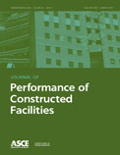
JOURNAL OF PERFORMANCE OF CONSTRUCTED FACILITIES
Pioneering Research for Reliable Civil Engineering SolutionsJOURNAL OF PERFORMANCE OF CONSTRUCTED FACILITIES, published by the ASCE-AMERICAN SOCIETY OF CIVIL ENGINEERS, is a leading peer-reviewed journal dedicated to the field of civil engineering with a strong emphasis on the performance assessment and sustainability of constructed facilities. Established in 1987 and converging through 2024, this journal has garnered a solid reputation with an impressive Q2 quartile ranking across key areas including Building and Construction, Civil and Structural Engineering, and Safety, Risk, Reliability and Quality. The journal's Scopus rankings further underline its significance, being positioned within the top percentiles of these domains. As it aims to publish innovative research, case studies, and reviews, the journal serves as a vital resource for professionals and academics who are keen on advancing their understanding of the complexities associated with the performance and reliability of civil infrastructure. Researchers and practitioners interested in the latest advancements in construction performance can greatly benefit from the insights and findings published in this esteemed journal.
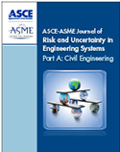
ASCE-ASME Journal of Risk and Uncertainty in Engineering Systems Part A-Civil Engineering
Empowering Civil Engineering Through Insightful Analysis.ASCE-ASME Journal of Risk and Uncertainty in Engineering Systems Part A-Civil Engineering, published by the American Society of Civil Engineers (ASCE), is a leading journal dedicated to advancing the understanding and application of risk and uncertainty in civil engineering systems. With an ISSN of 2376-7642, this journal has been a pivotal platform for researchers and practitioners since its inception in 2015, converging its rigorous exploration through to 2024. It holds a commendable position in the academic community, securing a Q2 rating in categories such as Building and Construction, Civil and Structural Engineering, and Safety, Risk, Reliability and Quality as of 2023. The journal aims to disseminate innovative research that tackles the critical challenges posed by uncertainty in engineering systems, thus promoting safety, sustainability, and reliability in infrastructure. With impressive Scopus rankings, including a 76th percentile in Building and Construction, it continues to attract high-quality contributions from scholars worldwide. Emphasizing open dialogue, the journal does not currently adopt an open access model but remains committed to providing essential insights for the enhancement of civil engineering practices. Researchers, professionals, and students alike will find invaluable resources to enhance their knowledge and practice in this dynamic field.

TEHNICKI GLASNIK-TECHNICAL JOURNAL
Empowering Research in Technical DisciplinesTEHNICKI GLASNIK-TECHNICAL JOURNAL is a peer-reviewed, open-access journal published by UNIV NORTH in Croatia, dedicated to fostering knowledge and innovation in the fields of engineering, computer science applications, and information systems. With an ISSN of 1846-6168 and an E-ISSN of 1848-5588, this journal has been a vital resource for researchers since its transition to open access in 2009, ensuring that valuable insights are freely available to the global academic community. Notably, it has achieved a commendable presence in various Scopus categories, including ranking in the 34th percentile for general engineering and engaging with emerging trends in areas like computer graphics and management information systems. As of 2023, it holds quartile rankings ranging from Q3 in engineering to Q4 in several computer science categories, underlining its diverse scope and relevance. The journal aims to provide a platform for rigorous research, innovative methodologies, and practical applications, making it essential reading for academics, practitioners, and students interested in advancing their understanding and practice in technical disciplines.

Journal of Pipeline Science and Engineering
Advancing Knowledge in Pipeline EngineeringWelcome to the Journal of Pipeline Science and Engineering, an esteemed academic platform dedicated to the advancement of knowledge in the critical disciplines of energy, fluid flow, and mechanical engineering. Published by KEAI PUBLISHING LTD in China, this open-access journal has been a pioneer in its field since its inception in 2021. With an impressive ranking in the top quartiles across multiple categories—Q2 in Energy (miscellaneous) and Q1 in Fluid Flow and Transfer Processes, Mechanical Engineering, and Safety, Risk, Reliability, and Quality—this journal is committed to disseminating high-quality research to a global audience. Researchers, professionals, and students will find the journal's content invaluable as it addresses contemporary challenges and innovations in pipeline engineering and related sectors. The Journal of Pipeline Science and Engineering aspires to be the central hub for sharing cutting-edge developments and fostering collaboration within the community. Stay at the forefront of research and join us in exploring the vital contributions of pipeline engineering to sustainable development and safety.
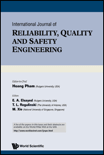
International Journal of Reliability Quality and Safety Engineering
Advancing Excellence in Reliability and Safety EngineeringThe International Journal of Reliability Quality and Safety Engineering, published by World Scientific Publishing Co Pte Ltd, is a leading platform for disseminating cutting-edge research in the fields of reliability, quality, and safety engineering. With an impressive scope that spans across aerospace, electrical engineering, nuclear energy, and industrial manufacturing, this journal serves as a critical resource for researchers and professionals aiming to enhance system dependability and operational excellence. Indexed in Scopus, it holds a respectable Q3 ranking across various categories in 2023, reflecting its growing influence in the academic community. Although currently not open access, it provides ample opportunities for scholars to publish impactful studies from its extensive database, which has evolved since 1996. The journal's commitment to advancing knowledge in reliability and safety engineering makes it a pivotal resource for those dedicated to improving engineering practices and protocols worldwide.

JOURNAL OF INTELLIGENT MANUFACTURING
Pioneering Knowledge in Intelligent Manufacturing and AIWelcome to the JOURNAL OF INTELLIGENT MANUFACTURING, an esteemed publication founded in 1990 and based in the Netherlands, published by Springer. With an impressive impact factor placing it within the Q1 category for fields such as Artificial Intelligence, Industrial and Manufacturing Engineering, and Software, this journal stands out as a leading resource for researchers, professionals, and students alike. Its rigorous peer-reviewed articles delve into innovative methodologies and cutting-edge technologies driving the future of manufacturing and AI, offering substantial insights into industry trends and challenges. Indexed in Scopus, the JOURNAL OF INTELLIGENT MANUFACTURING consistently ranks among the top tier of its field, affirming its role as a vital platform for intellectual exchange. Enhance your research and professional knowledge by engaging with the latest findings and developments published here.

Dyna
Fostering innovation through interdisciplinary collaboration.Dyna, with the ISSN 0012-7361 and E-ISSN 1989-1490, is a prominent academic journal published by the Federación Asociaciones Ingenieros Industriales España. Situated in Spain, it is dedicated to advancing knowledge and research in the field of engineering, specifically focusing on diverse aspects within the Engineering (Miscellaneous) category. With a current Scopus rank of #245 out of 307, Dyna operates in the 20th percentile, emphasizing the journal’s commitment to fostering innovation and dialogue among scholars and industry practitioners alike. Although it operates under traditional access models, the journal is pivotal for researchers, professionals, and students seeking to contribute to the evolving landscape of engineering disciplines. Covering a broad range of topics from 2009 to 2024, Dyna aims to facilitate interdisciplinary collaboration and disseminate cutting-edge findings that can influence both academia and industry.
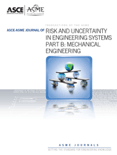
ASCE-ASME Journal of Risk and Uncertainty in Engineering Systems Part B-Mechanical Engineering
Exploring Uncertainty in Mechanical EngineeringASCE-ASME Journal of Risk and Uncertainty in Engineering Systems Part B-Mechanical Engineering, published by the reputable ASME, is a leading platform dedicated to advancing knowledge in the field of mechanical engineering with a particular emphasis on risk assessment and uncertainty analysis. With an ISSN of 2332-9017 and an E-ISSN of 2332-9025, this journal has established itself as a significant contributor to ongoing research in safety, risk, and reliability, consistently ranking in the Q2 quartile for Mechanical Engineering as well as Safety Research categories. As evidenced by its impressive Scopus rankings—including a notable 80th percentile in Safety Research—this journal fosters high-quality research that informs engineering practices and enhances safety protocols. Operating under a traditional access model, it aims to provide researchers, professionals, and students with essential insights and methodologies to address contemporary challenges in engineering systems. Each contribution reflects an aim to bridge theory and application, thus making the journal an invaluable resource for stakeholders striving for excellence in mechanical engineering and safety management.
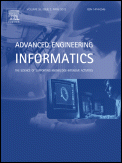
ADVANCED ENGINEERING INFORMATICS
Connecting Researchers to Drive Engineering ProgressADVANCED ENGINEERING INFORMATICS is a prestigious journal published by Elsevier Science Ltd, dedicated to the interdisciplinary fields of Artificial Intelligence and Information Systems. Established in 2002, this journal serves as a vital platform for researchers and practitioners to disseminate groundbreaking insights and innovations that shape the future of engineering and technological integration. With an impressive impact factor and ranked in the Q1 category for both Artificial Intelligence and Information Systems in 2023, it holds a prominent position, with Scopus rankings placing it in the 92nd percentile among 394 journals in Computer Science Information Systems and the 87th percentile among 350 journals in Computer Science Artificial Intelligence. ADVANCED ENGINEERING INFORMATICS embraces an Open Access model, ensuring that cutting-edge research is accessible to a global audience, fostering collaboration and development across academic and professional circles. The journal is committed to advancing knowledge and influencing practice, paving the way for the next generation of technologies that enhance engineering informatics.
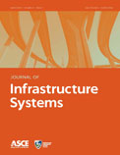
Journal of Infrastructure Systems
Navigating the Complexities of Modern Infrastructure SystemsJournal of Infrastructure Systems is a premier publication in the field of Civil and Structural Engineering, managed by the ASCE - American Society of Civil Engineers. Established in 1995, this journal serves as a vital platform for the dissemination of cutting-edge research related to diverse aspects of infrastructure systems, including construction, operation, and maintenance. With an impressive Scopus ranking placing it in the 77th percentile among its peers, it is recognized within the Q2 category for Civil and Structural Engineering, reflecting its significant impact on the discipline. Researchers, professionals, and students will find the journal invaluable as it hosts a wide range of contributions that address contemporary challenges in infrastructure development, sustainability, and resilience. Although not an open-access journal, it ensures superior quality and scholarly rigor, making it a critical resource for advancing knowledge in the infrastructure domain.